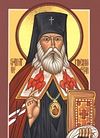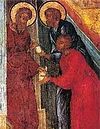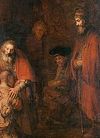

| Previous day | Next day |
| Old Style
February 3
|
Sunday |
New Style
February 16
|
| Sunday of the Prodigal Son. Tone 2. | No fast.
|
![]() Afterfeast of the Meeting of Our Lord.
Afterfeast of the Meeting of Our Lord. ![]() Holy and Righteous Symeon the God-receiver and Anna the Prophetess (1st c.).
Holy and Righteous Symeon the God-receiver and Anna the Prophetess (1st c.). ![]() St. Nicholas, Equal-to-the-Apostles, enlightener of Japan (1912).
St. Nicholas, Equal-to-the-Apostles, enlightener of Japan (1912).
Prophet Azariah (10th c. в до Р.10th c..). Martyrs Papias, Diodorus, and Claudianus, at Perge in Pamphylia (250). Martyr Blaise of Caesarea in Cappadocia (3rd c.). Martyrs Adrian and Eubulus, at Caesarea in Cappadocia (ca. 308-309). St. Romanus, prince of Uglich (1285). St. Symeon, bishop of Polotsk and Tver (1289). St. Svyatoslav-Gabriel and his son St. Dimitry, of Yuriev (1253). St. Ignatius of Mariupol in Crimea, metropolitan of Gothia and Kafa (1786).
New Hieromartyrs Vladimir (Zagreba), hieromonk of Borisoglebsk Monastery (Novotorzhok), Basil Zalessky, archpriest, of Astrakhan, and Adrian Troitsky, archpriest, of Kazan (1938).
Martyr Paul the Syrian (284-305). St. Lawrence, archbishop of Canterbury (619). St. Werburga of Chester, abbess (ca. 700). St. Ansgar, bishop of Hamburg, enlightener of Denmark and Sweden (865). St. James, archbishop of Serbia (1292). St. Sabbas of Ioannina (15th c.). New Martyrs Stamatius and John, brothers, and Nicholas, their companion, at Spetses on Chios (1822).
Repose of Schemamonk Paul of Simonov Monastery (1825), disciple of St. Paisius (Velichkovsky), and Hieromonk Isidore of Gethsemane Skete, Moscow (1908).
Thoughts for Each Day of the Year
According to the Daily Church Readings from the Word of God
By St. Theophan the Recluse

Sunday of the Prodigal Son (34th). [I Cor. 6:12–20; Luke 15:11–32]
The week of the prodigal speaks of so much to us! It speaks about our peace and satisfaction in the house of the heavenly Father, about our mad departure from the Father’s guardianship to unbridled freedom, about the richness of the heritage given us despite our disobedience, about its reckless waste on all sorts of indecencies, and about our utter impoverishment as a result. But then it talks also about how one recovers his senses, and, coming to himself, decides to return to his greatly merciful Father. It talks about how he returns, how he is received lovingly, and is restored to his first state. Who will not find this lesson profitable? If you abide in your father’s house, do not strive for freedom. You see how a similar experience ended! If you have run away and are squandering all, end this quickly. If you have already squandered everything and are living in poverty, decide quickly to return—and then, return. There every indulgence, and all the former love and satisfaction, await you. This last step is the most necessary one. But there is no point in enlarging upon this. All has been said concisely and clearly. Come to your senses, decide to return, arise and hurry to the Father. His embrace is open and ready to receive you.
Articles
 Prophet AzariahThe name Azariah means “whom God helps.” The holy prophet lived during King Asa’s reign (2 Chron. 15:1). |
 Martyrs Papias, Diodorus, and Claudianus, at Perge in PamphyliaSaint Papias was martyred with Saint Claudianus at Perge, Pamphylia in 250. |
 Martyr Blaise of Caesarea, in CappadociaSaint Blaise of Caesarea lived in the third century. He was from Caesarea in Cappadocia (Asia Minor) and was a shepherd. |
 Martyr Adrian at Caesarea, CappadociaSaint Adrian of Baneas of Caesarea in Cappadocia. suffered martyrdom under Governor Firmilianus. |
 Martyr Eubulus at Caesarea, CappadociaSaint Eubulus, like Saint Adrian, was from Baneas, in Caesarea of Cappadocia. |
 St. Simeon the Bishop of Polotsk and TverSaint Simeon, Bishop of Tver was descended from the Polotsk princes. He was the seventh bishop of Polotsk and the first bishop of the Tver diocese. |











